Table of Contents
The Indian retail market has witnessed a paradigm shift with the advent of RetailTech startups, leveraging technology to enhance the retail experience for both businesses and consumers. These startups are driving innovation across various facets of the retail ecosystem, from inventory management to customer engagement, offering cutting-edge solutions that cater to the dynamic needs of the market. Here’s a look at the top 10 retail tech startups in India that are making significant strides in the industry.
1. ShopX
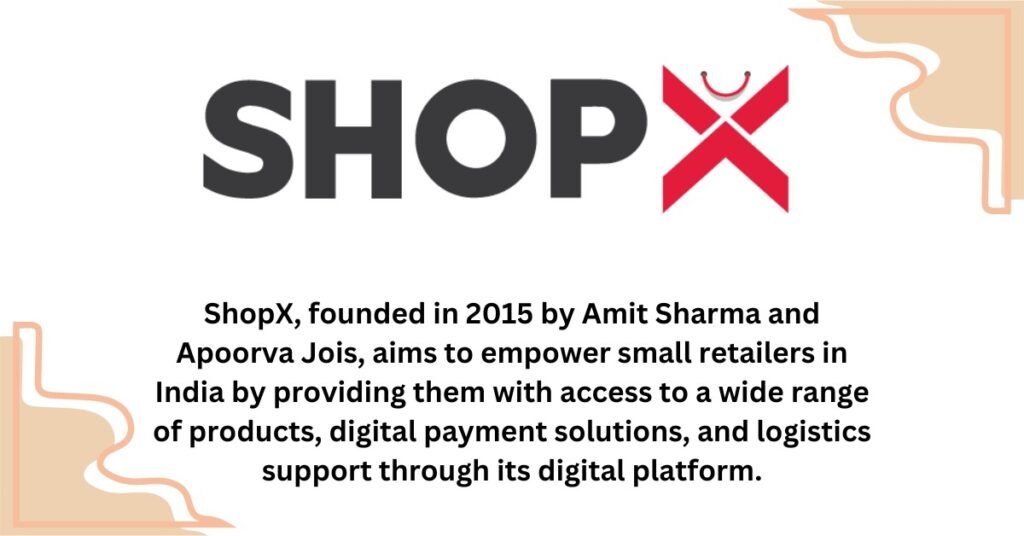
Founded in 2015 by Amit Sharma and Apoorva Jois, ShopX aims to empower small retailers by providing them access to a vast range of products, digital payment solutions, and logistics support. With its proprietary digital platform, ShopX bridges the gap between brands and retailers, ensuring efficient supply chain management and enabling local stores to compete with larger retail chains.
| Feature | Description |
|---|---|
| Founded | 2015 |
| Founders | Amit Sharma, Apoorva Jois |
| Mission | Empower small retailers by providing access to a vast range of products, digital payment solutions, and logistics support. |
| Key Technologies | Digital platform for supply chain management |
| Services | Inventory management, digital payments, logistics support |
| Impact | Helps local stores compete with larger retail chains by improving efficiency and product availability. |
2. Ninjacart
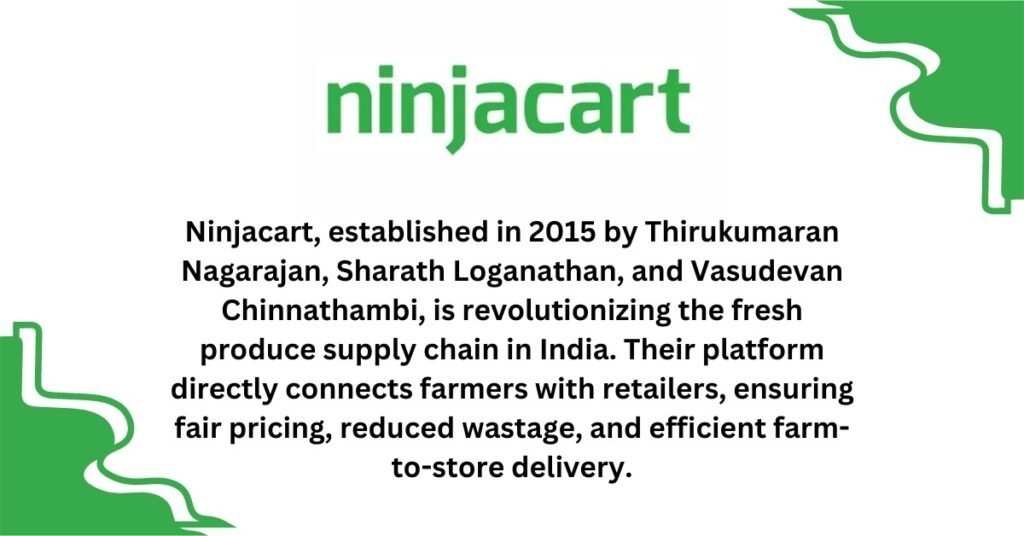
Ninjacart, established in 2015 by Thirukumaran Nagarajan, Sharath Loganathan, and Vasudevan Chinnathambi, is revolutionizing the fresh produce supply chain. By connecting farmers directly with retailers, Ninjacart reduces wastage, ensures fair prices, and delivers fresh produce efficiently. Their data-driven approach and logistics network streamline the entire farm-to-store process, benefiting both producers and consumers.
| Feature | Description |
|---|---|
| Founded | 2015 |
| Founders | Thirukumaran Nagarajan, Sharath Loganathan, Vasudevan Chinnathambi |
| Mission | Revolutionize the fresh produce supply chain by connecting farmers directly with retailers. |
| Key Technologies | Data-driven logistics network |
| Services | Direct farm-to-store supply chain management, fair pricing, reduced wastage |
| Impact | Ensures fresh produce delivery, improves farmer incomes, and reduces food wastage. |
3. Fynd

Fynd, co-founded by Harsh Shah, Farooq Adam, and Sreeraman MG in 2012, is an omnichannel platform that helps retailers manage their online and offline inventory seamlessly. By integrating various sales channels, Fynd enables real-time inventory visibility and ensures customers can access the products they want, wherever they are. This startup’s technology solutions help retailers enhance their customer reach and optimize sales.
| Feature | Description |
|---|---|
| Founded | 2012 |
| Founders | Harsh Shah, Farooq Adam, Sreeraman MG |
| Mission | Provide an omnichannel platform to manage online and offline inventory seamlessly. |
| Key Technologies | Inventory integration, real-time visibility |
| Services | Inventory management, sales optimization, customer reach enhancement |
| Impact | Enhances customer reach, optimizes sales channels, and provides seamless shopping experiences. |
4. SnapBizz

SnapBizz, founded by Prem Kumar in 2013, focuses on digitizing traditional kirana stores (small neighborhood shops) across India. The startup provides smart point-of-sale (POS) devices that help these stores manage inventory, billing, and customer engagement. By bringing technology to the grassroots level, SnapBizz is transforming the operations of kirana stores and enhancing their competitiveness.
| Feature | Description |
|---|---|
| Founded | 2013 |
| Founder | Prem Kumar |
| Mission | Digitize traditional kirana stores with smart POS devices. |
| Key Technologies | Smart POS systems |
| Services | Inventory management, billing, customer engagement |
| Impact | Transforms kirana store operations, enhances competitiveness, and improves efficiency. |
5. Haptik

Haptik, a conversational AI platform founded by Aakrit Vaish and Swapan Rajdev in 2013, is redefining customer service and engagement in the retail sector. By deploying AI-powered chatbots, Haptik enables retailers to provide personalized shopping experiences, streamline customer queries, and improve overall service efficiency. Their solutions cater to a wide range of retail needs, from customer support to sales assistance.
| Feature | Description |
|---|---|
| Founded | 2013 |
| Founders | Aakrit Vaish, Swapan Rajdev |
| Mission | Redefine customer service and engagement through AI-powered chatbots. |
| Key Technologies | Conversational AI, machine learning |
| Services | Personalized shopping experiences, automated customer service, sales assistance |
| Impact | Streamlines customer queries, improves service efficiency, and enhances customer satisfaction. |
6. Bikayi

Founded in 2019 by Sonakshi Nathani and Ashutosh Singhal, Bikayi is an e-commerce enabler for small businesses. The platform allows local retailers to set up online stores, manage orders, and engage with customers through WhatsApp. Bikayi’s user-friendly interface and comprehensive support help traditional businesses transition to the digital space, enhancing their market reach and sales potential.
| Feature | Description |
|---|---|
| Founded | 2019 |
| Founders | Sonakshi Nathani, Ashutosh Singhal |
| Mission | Enable small businesses to transition to online stores and engage with customers through WhatsApp. |
| Key Technologies | E-commerce platform, WhatsApp integration |
| Services | Online store setup, order management, customer engagement |
| Impact | Helps traditional businesses go digital, expand market reach, and increase sales potential. |
7. Anchanto
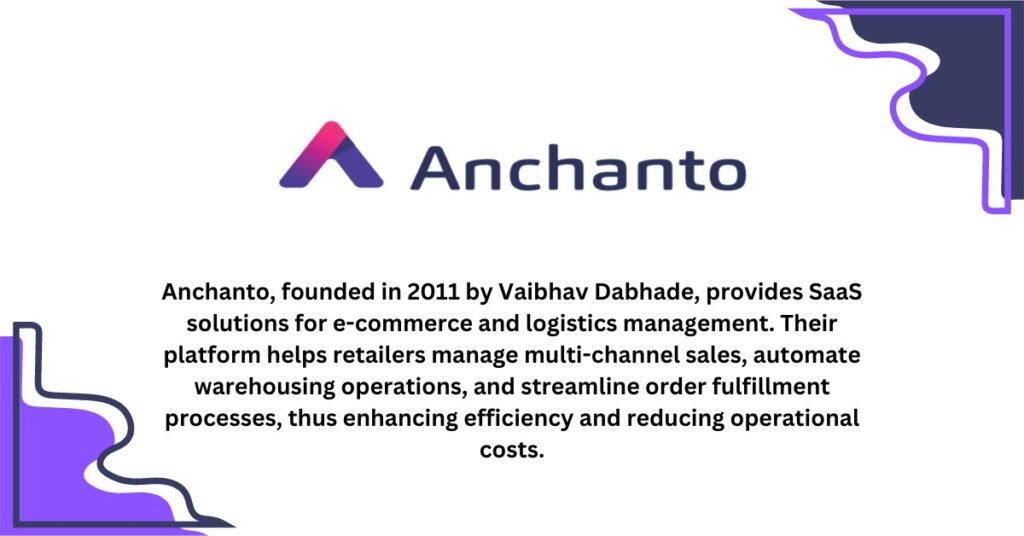
Anchanto, co-founded by Vaibhav Dabhade in 2011, offers a SaaS platform for e-commerce and logistics management. The platform enables retailers to manage multi-channel sales, automate warehousing operations, and streamline order fulfillment processes. Anchanto’s technology helps retailers enhance efficiency, reduce operational costs, and improve customer satisfaction.
| Feature | Description |
|---|---|
| Founded | 2011 |
| Founder | Vaibhav Dabhade |
| Mission | Provide SaaS solutions for e-commerce and logistics management. |
| Key Technologies | Cloud computing, multi-channel sales integration |
| Services | E-commerce management, warehousing automation, order fulfillment |
| Impact | Enhances efficiency, reduces operational costs, and improves customer satisfaction. |
8. Browntape
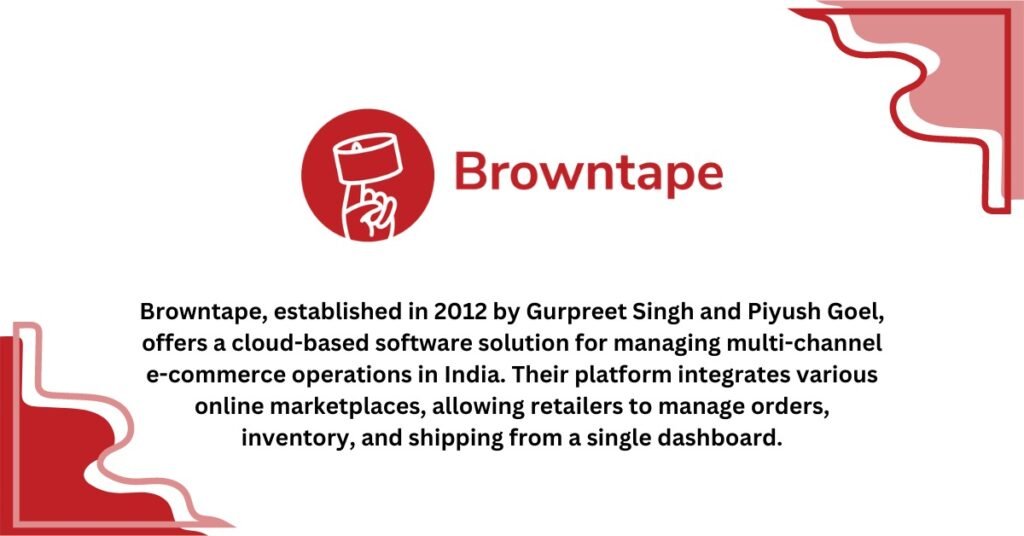
Browntape, established in 2012 by Gurpreet Singh and Piyush Goel, provides a cloud-based software solution for managing multi-channel e-commerce operations. The platform integrates various online marketplaces, allowing retailers to manage orders, inventory, and shipping from a single dashboard. Browntape’s solutions help retailers optimize their online presence and streamline operations.
| Feature | Description |
|---|---|
| Founded | 2012 |
| Founders | Gurpreet Singh, Piyush Goel |
| Mission | Provide a cloud-based software solution for managing multi-channel e-commerce operations. |
| Key Technologies | Cloud-based platform, integration with online marketplaces |
| Services | Order management, inventory management, shipping solutions |
| Impact | Optimizes online presence, streamlines e-commerce operations, and reduces errors. |
9. Peel-Works
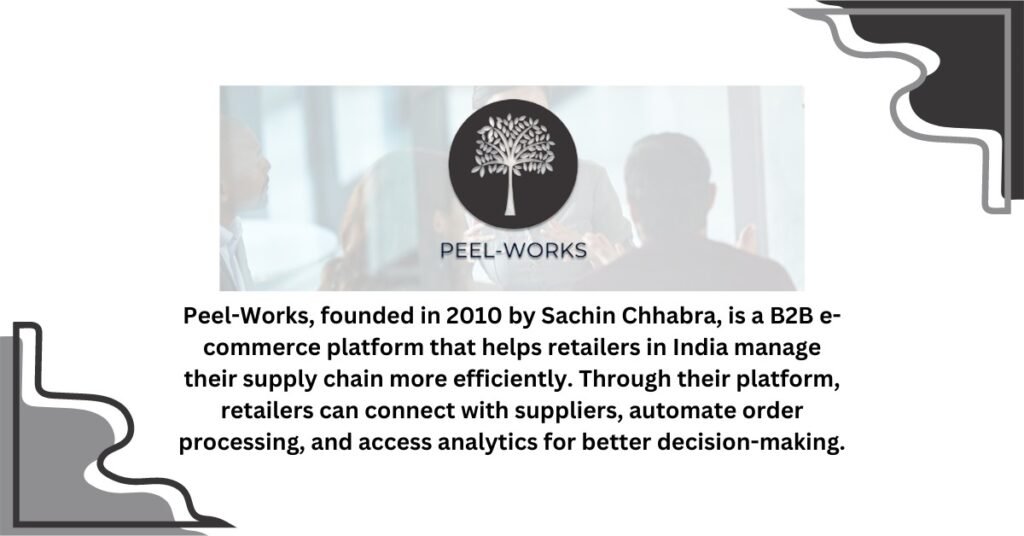
Peel-Works, founded by Sachin Chhabra in 2010, is a B2B e-commerce platform that helps retailers manage their supply chain more efficiently. By leveraging technology, Peel-Works connects retailers with suppliers, automates order processing, and provides analytics for better decision-making. Their platform enhances the efficiency of small and medium-sized retailers, enabling them to compete more effectively in the market.
| Feature | Description |
|---|---|
| Founded | 2010 |
| Founder | Sachin Chhabra |
| Mission | Help retailers manage their supply chain more efficiently through a B2B e-commerce platform. |
| Key Technologies | Supply chain automation, data analytics |
| Services | Order processing, supplier connection, analytics |
| Impact | Enhances supply chain efficiency, improves decision-making, and supports small and medium-sized retailers. |
10. Unicommerce
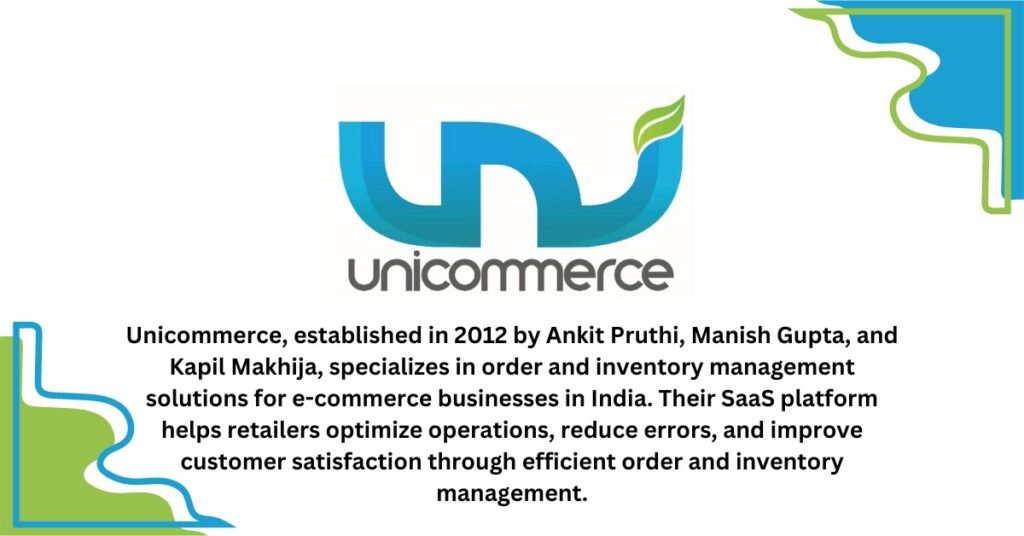
Unicommerce, a SaaS platform founded by Ankit Pruthi, Manish Gupta, and Kapil Makhija in 2012, specializes in order and inventory management for e-commerce businesses. The platform offers solutions for warehouse management, multi-channel selling, and returns management. Unicommerce’s technology helps retailers optimize their operations, reduce errors, and improve customer satisfaction.
| Feature | Description |
|---|---|
| Founded | 2012 |
| Founders | Ankit Pruthi, Manish Gupta, Kapil Makhija |
| Mission | Provide SaaS solutions for order and inventory management for e-commerce businesses. |
| Key Technologies | Cloud-based platform, multi-channel selling integration |
| Services | Order management, inventory management, warehouse management, returns management |
| Impact | Optimizes e-commerce operations, reduces errors, and enhances customer satisfaction. |
The RetailTech landscape in India is bustling with innovation, driven by startups that are leveraging technology to address the unique challenges faced by the retail sector. These startups are not only enhancing operational efficiencies but also providing retailers with the tools to offer superior customer experiences. As the retail industry continues to evolve, the contributions of these top 10 RetailTech startups are poised to play a pivotal role in shaping the future of retail in India.
FAQs on RetailTech Startups in India
1. What is RetailTech?
RetailTech refers to the use of technology to improve and optimize retail operations. This includes everything from inventory management and supply chain logistics to customer engagement and sales strategies. RetailTech solutions can involve software, hardware, and integrated systems designed to enhance the efficiency and effectiveness of retail businesses.
2. Why is RetailTech important for the retail industry in India?
RetailTech is crucial for the retail industry in India because it helps address many challenges faced by retailers, such as inventory management, supply chain inefficiencies, customer engagement, and competition from e-commerce giants. By adopting RetailTech solutions, retailers can streamline operations, reduce costs, improve customer experiences, and stay competitive in a rapidly evolving market.
3. How do RetailTech startups help small and traditional retailers?
RetailTech startups provide small and traditional retailers with access to advanced technologies that were previously only available to large retailers. These solutions include smart POS systems, digital payment options, online store platforms, and logistics support. By adopting these technologies, small retailers can enhance their operational efficiency, expand their customer base, and compete more effectively in the market.
4. What are some key technologies used by RetailTech startups?
Key technologies used by RetailTech startups include:
- Artificial Intelligence (AI) and Machine Learning (ML): For predictive analytics, personalized customer experiences, and automated customer service.
- Internet of Things (IoT): For real-time inventory tracking and supply chain management.
- Cloud Computing: For scalable and flexible e-commerce and inventory management solutions.
- Blockchain: For transparent and secure transactions and supply chain management.
- Mobile Applications: For customer engagement, online ordering, and digital payments.
5. Can RetailTech startups help with online and offline integration?
Yes, many RetailTech startups specialize in omnichannel solutions that integrate online and offline sales channels. These solutions provide real-time inventory visibility, unified customer data, and seamless order management, ensuring a cohesive shopping experience for customers regardless of whether they shop online or in-store.
6. What are some challenges faced by RetailTech startups in India?
RetailTech startups in India face several challenges, including:
- Market Penetration: Convincing traditional retailers to adopt new technologies.
- Infrastructure: Limited digital infrastructure in some regions.
- Regulatory Hurdles: Navigating complex regulations and compliance requirements.
- Competition: Intense competition from established players and other startups.
- Funding: Securing sufficient funding for growth and expansion.
7. How do RetailTech solutions enhance customer engagement?
RetailTech solutions enhance customer engagement by offering personalized shopping experiences, improving customer service, and providing seamless omnichannel interactions. Technologies like AI-powered chatbots, loyalty programs, and personalized marketing campaigns help retailers build stronger relationships with their customers and increase customer satisfaction and loyalty.
8. What role do data analytics play in RetailTech?
Data analytics play a crucial role in RetailTech by providing insights into customer behavior, sales trends, inventory levels, and supply chain performance. By leveraging data analytics, retailers can make informed decisions, optimize operations, and create targeted marketing strategies. Predictive analytics also help in forecasting demand and managing stock levels more efficiently.
9. How can RetailTech startups contribute to sustainable retail practices?
RetailTech startups can contribute to sustainable retail practices by optimizing supply chain operations to reduce waste, implementing energy-efficient technologies, and promoting sustainable sourcing and production practices. Solutions like real-time inventory management and demand forecasting help minimize overproduction and excess inventory, contributing to more sustainable retail operations.
10. What is the future outlook for RetailTech in India?
The future outlook for RetailTech in India is promising, driven by increasing digital adoption, growing consumer expectations, and advancements in technology. As more retailers recognize the benefits of RetailTech, the demand for innovative solutions is expected to rise, leading to further growth and evolution of the RetailTech landscape in India.
These FAQs provide a comprehensive overview of the key aspects and considerations related to RetailTech startups in India, highlighting their impact, challenges, and future potential in the retail sector.
Also read



